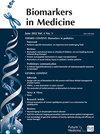Methemoglobin in critically ill septic patients.
IF 2.1
4区 医学
Q3 MEDICINE, RESEARCH & EXPERIMENTAL
引用次数: 0
Abstract
Aim: Higher nitric oxide (NO) levels correlate with adverse sepsis outcomes but are challenging to measure. Methemoglobin (MetHb), a measurable product of NO, has not been utilized for risk stratification.Methodology: All patients with sepsis admitted to the intensive care unit (ICU) that had at least one MetHb measurement within 24 h of ICU admission were retrospectively analyzed. We assessed the epidemiology and associations of MetHb with hospital mortality.Results: Among 7724 patients, 1046 qualified. Those with MetHb ≥1.6% showed significantly higher mortality and fewer days alive outside the hospital by day 28. MetHb levels ≥1.6% independently predicted increased 28-day mortality.Conclusion: Our findings suggest MetHb, easily obtainable from arterial blood gases, can significantly enhance sepsis risk stratification.重症脓毒症患者体内的高铁血红蛋白。
目的:较高的一氧化氮(NO)水平与脓毒症的不良预后相关,但难以测量。高铁血红蛋白(MetHb)是一氧化氮的可测量产物,但尚未用于风险分层:我们对重症监护室(ICU)收治的所有脓毒症患者进行了回顾性分析,这些患者在入院 24 小时内至少测量过一次 MetHb。我们评估了MetHb的流行病学和与住院死亡率的关系:在 7724 名患者中,有 1046 人符合条件。MetHb≥1.6% 的患者死亡率明显较高,第 28 天时在医院外存活的天数也较少。MetHb 水平≥1.6% 可独立预测 28 天死亡率的增加:我们的研究结果表明,从动脉血气中很容易获得的 MetHb 可以显著提高脓毒症风险分层的能力。
本文章由计算机程序翻译,如有差异,请以英文原文为准。
求助全文
约1分钟内获得全文
求助全文
来源期刊

Biomarkers in medicine
医学-医学:研究与实验
CiteScore
3.80
自引率
4.50%
发文量
86
审稿时长
6-12 weeks
期刊介绍:
Biomarkers are physical, functional or biochemical indicators of physiological or disease processes. These key indicators can provide vital information in determining disease prognosis, in predicting of response to therapies, adverse events and drug interactions, and in establishing baseline risk. The explosion of interest in biomarker research is driving the development of new predictive, diagnostic and prognostic products in modern medical practice, and biomarkers are also playing an increasingly important role in the discovery and development of new drugs. For the full utility of biomarkers to be realized, we require greater understanding of disease mechanisms, and the interplay between disease mechanisms, therapeutic interventions and the proposed biomarkers. However, in attempting to evaluate the pros and cons of biomarkers systematically, we are moving into new, challenging territory.
Biomarkers in Medicine (ISSN 1752-0363) is a peer-reviewed, rapid publication journal delivering commentary and analysis on the advances in our understanding of biomarkers and their potential and actual applications in medicine. The journal facilitates translation of our research knowledge into the clinic to increase the effectiveness of medical practice.
As the scientific rationale and regulatory acceptance for biomarkers in medicine and in drug development become more fully established, Biomarkers in Medicine provides the platform for all players in this increasingly vital area to communicate and debate all issues relating to the potential utility and applications.
Each issue includes a diversity of content to provide rounded coverage for the research professional. Articles include Guest Editorials, Interviews, Reviews, Research Articles, Perspectives, Priority Paper Evaluations, Special Reports, Case Reports, Conference Reports and Company Profiles. Review coverage is divided into themed sections according to area of therapeutic utility with some issues including themed sections on an area of topical interest.
Biomarkers in Medicine provides a platform for commentary and debate for all professionals with an interest in the identification of biomarkers, elucidation of their role and formalization and approval of their application in modern medicine. The audience for Biomarkers in Medicine includes academic and industrial researchers, clinicians, pathologists, clinical chemists and regulatory professionals.
 求助内容:
求助内容: 应助结果提醒方式:
应助结果提醒方式:


